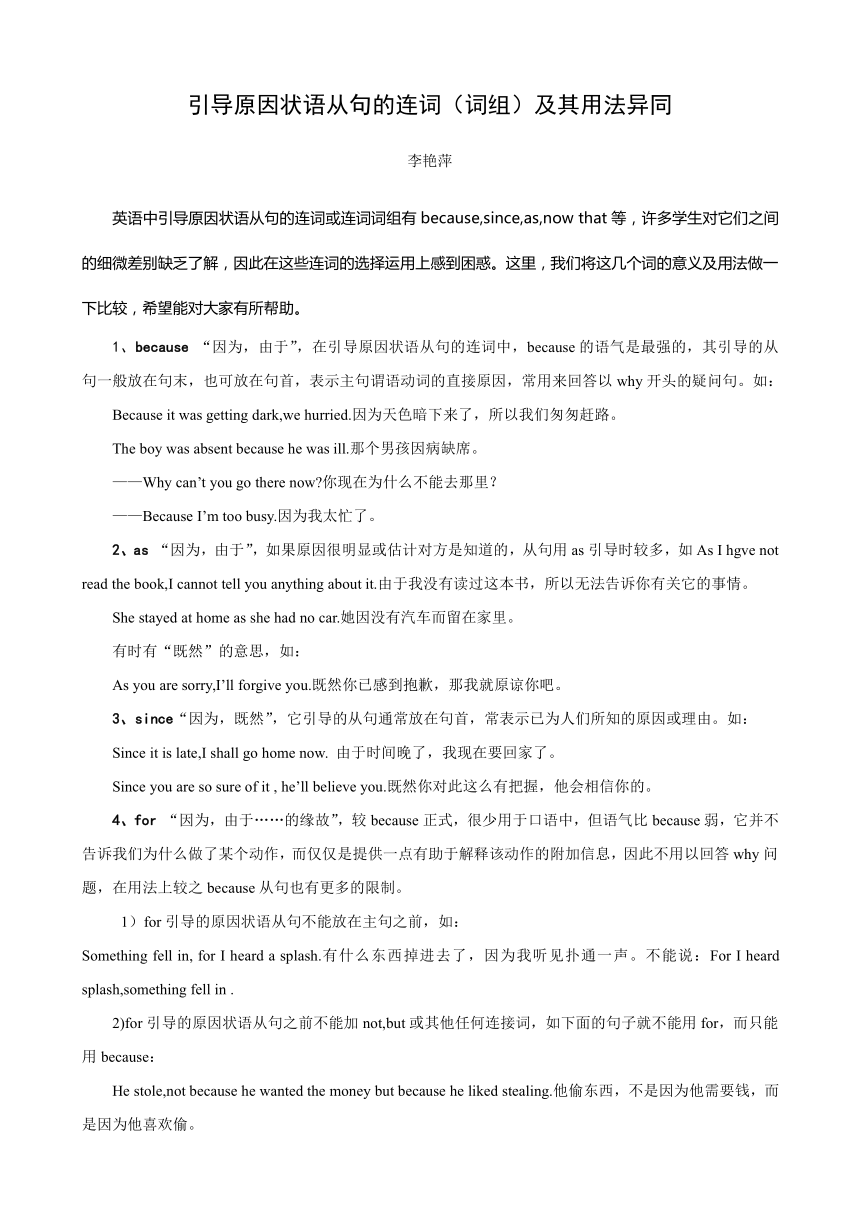状语从句[下学期]
图片预览

文档简介
引导原因状语从句的连词(词组)及其用法异同
李艳萍
英语中引导原因状语从句的连词或连词词组有because,since,as,now that等,许多学生对它们之间的细微差别缺乏了解,因此在这些连词的选择运用上感到困惑。这里,我们将这几个词的意义及用法做一下比较,希望能对大家有所帮助。
1、because “因为,由于”,在引导原因状语从句的连词中,because的语气是最强的,其引导的从句一般放在句末,也可放在句首,表示主句谓语动词的直接原因,常用来回答以why开头的疑问句。如:
Because it was getting dark,we hurried.因为天色暗下来了,所以我们匆匆赶路。
The boy was absent because he was ill.那个男孩因病缺席。
——Why can’t you go there now 你现在为什么不能去那里?
——Because I’m too busy.因为我太忙了。
2、as “因为,由于”,如果原因很明显或估计对方是知道的,从句用as引导时较多,如As I hgve not read the book,I cannot tell you anything about it.由于我没有读过这本书,所以无法告诉你有关它的事情。
She stayed at home as she had no car.她因没有汽车而留在家里。
有时有“既然”的意思,如:
As you are sorry,I’ll forgive you.既然你已感到抱歉,那我就原谅你吧。
3、since“因为,既然”,它引导的从句通常放在句首,常表示已为人们所知的原因或理由。如:
Since it is late,I shall go home now. 由于时间晚了,我现在要回家了。
Since you are so sure of it , he’ll believe you.既然你对此这么有把握,他会相信你的。
4、for “因为,由于……的缘故”,较because正式,很少用于口语中,但语气比because弱,它并不告诉我们为什么做了某个动作,而仅仅是提供一点有助于解释该动作的附加信息,因此不用以回答why问题,在用法上较之because从句也有更多的限制。
1)for引导的原因状语从句不能放在主句之前,如:
Something fell in, for I heard a splash.有什么东西掉进去了,因为我听见扑通一声。不能说:For I heard splash,something fell in .
2)for引导的原因状语从句之前不能加not,but或其他任何连接词,如下面的句子就不能用for,而只能用because:
He stole,not because he wanted the money but because he liked stealing.他偷东西,不是因为他需要钱,而是因为他喜欢偷。
3)此外,for引导的原因状语从句不能仅仅重复已经陈述过的内容,而总要包含新的信息,如:
She was angry,for she didn’t know French.她很生气,因为她不懂法语。
但下面这句话,就不能用for:
He spoke in French.She was angry because he had spoken in French.他说法语,她很生气,因为她说法语。
5、now that “既然”,“由于”,与since表示的意思相似,与since不同的是,now that有“时间”含义,只用于有新情况发生的时候。如:
Now that the rain has stopped,let’s go at once.既然雨已停了,我们就回家吧。
Now that they are all gone,you can tell me the secret.既然他们都已走了,你可以告诉我这个秘密了。
而下面这句话就只能用since,不能用now that:
Since no one has read the book,we can’t discuss it.既然没人读过这本书,我们就不能对它进行讨论。
6、seeing(that) 和considering(that)“鉴于”“由于”“因为”“考虑到……”“就……来说”,有“条件”含义。如:
Seeing that it is 8 o’clock ,we’ll wait no longer.由于时间已到8点,我们将不再等了。
Considering he was new at the job,he did quite well.考虑到他是个新手,他已干得很不错了。
7、in that “既然”“因为”,多用于书面语中。如:
I prefer John’s plan to yours , in that it is more feasible and easier to be carried out.与你的计划相比,我更喜欢约翰的,因为他的计划更可行,也更容易执行。
The budget they made is unrealistic in that it disregards increased costs.因为没有考虑到消费的增长,他们做出的预算是不符合实际的。
李艳萍
英语中引导原因状语从句的连词或连词词组有because,since,as,now that等,许多学生对它们之间的细微差别缺乏了解,因此在这些连词的选择运用上感到困惑。这里,我们将这几个词的意义及用法做一下比较,希望能对大家有所帮助。
1、because “因为,由于”,在引导原因状语从句的连词中,because的语气是最强的,其引导的从句一般放在句末,也可放在句首,表示主句谓语动词的直接原因,常用来回答以why开头的疑问句。如:
Because it was getting dark,we hurried.因为天色暗下来了,所以我们匆匆赶路。
The boy was absent because he was ill.那个男孩因病缺席。
——Why can’t you go there now 你现在为什么不能去那里?
——Because I’m too busy.因为我太忙了。
2、as “因为,由于”,如果原因很明显或估计对方是知道的,从句用as引导时较多,如As I hgve not read the book,I cannot tell you anything about it.由于我没有读过这本书,所以无法告诉你有关它的事情。
She stayed at home as she had no car.她因没有汽车而留在家里。
有时有“既然”的意思,如:
As you are sorry,I’ll forgive you.既然你已感到抱歉,那我就原谅你吧。
3、since“因为,既然”,它引导的从句通常放在句首,常表示已为人们所知的原因或理由。如:
Since it is late,I shall go home now. 由于时间晚了,我现在要回家了。
Since you are so sure of it , he’ll believe you.既然你对此这么有把握,他会相信你的。
4、for “因为,由于……的缘故”,较because正式,很少用于口语中,但语气比because弱,它并不告诉我们为什么做了某个动作,而仅仅是提供一点有助于解释该动作的附加信息,因此不用以回答why问题,在用法上较之because从句也有更多的限制。
1)for引导的原因状语从句不能放在主句之前,如:
Something fell in, for I heard a splash.有什么东西掉进去了,因为我听见扑通一声。不能说:For I heard splash,something fell in .
2)for引导的原因状语从句之前不能加not,but或其他任何连接词,如下面的句子就不能用for,而只能用because:
He stole,not because he wanted the money but because he liked stealing.他偷东西,不是因为他需要钱,而是因为他喜欢偷。
3)此外,for引导的原因状语从句不能仅仅重复已经陈述过的内容,而总要包含新的信息,如:
She was angry,for she didn’t know French.她很生气,因为她不懂法语。
但下面这句话,就不能用for:
He spoke in French.She was angry because he had spoken in French.他说法语,她很生气,因为她说法语。
5、now that “既然”,“由于”,与since表示的意思相似,与since不同的是,now that有“时间”含义,只用于有新情况发生的时候。如:
Now that the rain has stopped,let’s go at once.既然雨已停了,我们就回家吧。
Now that they are all gone,you can tell me the secret.既然他们都已走了,你可以告诉我这个秘密了。
而下面这句话就只能用since,不能用now that:
Since no one has read the book,we can’t discuss it.既然没人读过这本书,我们就不能对它进行讨论。
6、seeing(that) 和considering(that)“鉴于”“由于”“因为”“考虑到……”“就……来说”,有“条件”含义。如:
Seeing that it is 8 o’clock ,we’ll wait no longer.由于时间已到8点,我们将不再等了。
Considering he was new at the job,he did quite well.考虑到他是个新手,他已干得很不错了。
7、in that “既然”“因为”,多用于书面语中。如:
I prefer John’s plan to yours , in that it is more feasible and easier to be carried out.与你的计划相比,我更喜欢约翰的,因为他的计划更可行,也更容易执行。
The budget they made is unrealistic in that it disregards increased costs.因为没有考虑到消费的增长,他们做出的预算是不符合实际的。
